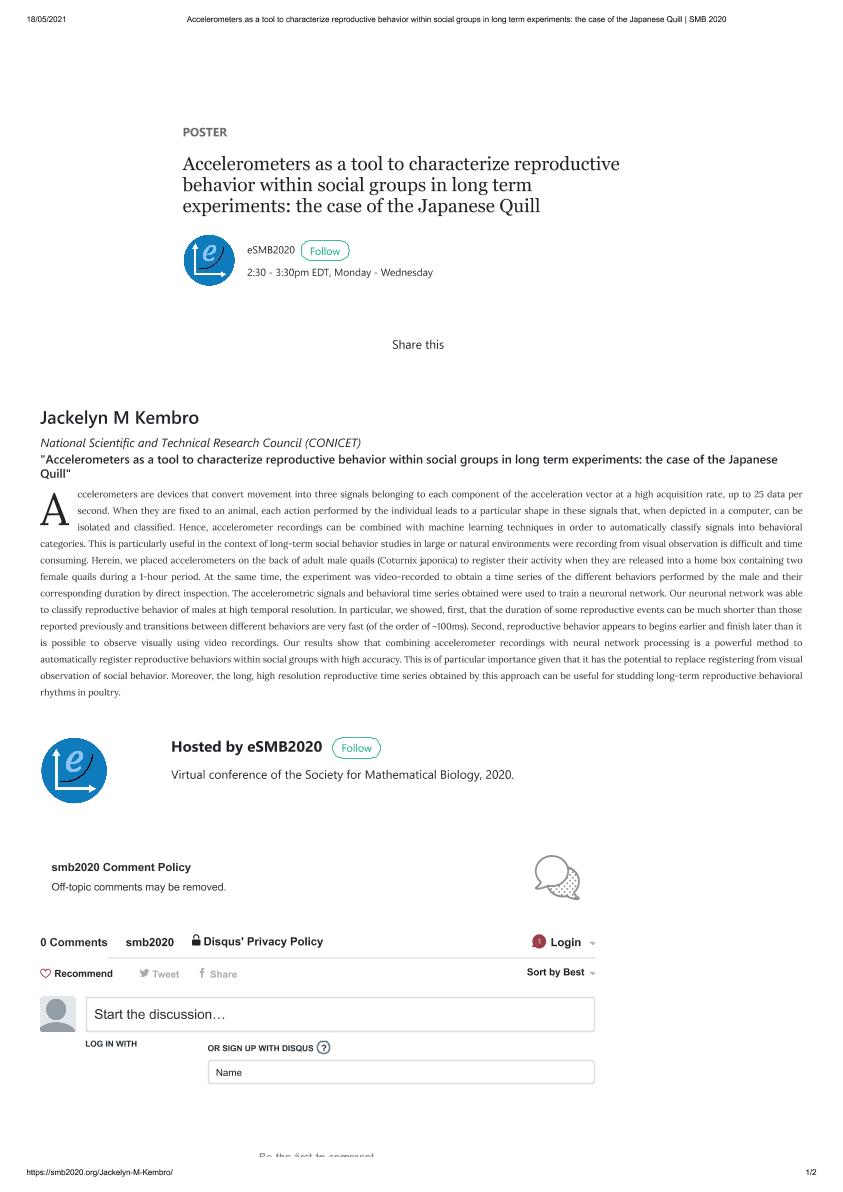Evento
Accelerometers as a tool to characterize reproductive behavior within social groups in long term experiments: The case of the Japanese Quail
Colaboradores:
Enderling, Heiko; Kirschner, Denise
Tipo del evento:
Reunión
Nombre del evento:
SMB 2020 Annual Meeting
Fecha del evento:
17/08/2020
Institución Organizadora:
Society for Mathematical Biology;
Título de la revista:
SMB 2020 Annual Meeting
Editorial:
Society for Mathematical Biology
Idioma:
Inglés
Clasificación temática:
Resumen
Accelerometers are devices that convert movement into three signals belonging to each component of the acceleration vector at a high acquisition rate, up to 25 data per second. When they are fixed to an animal, each action performed by the individual leads to a particular shape in these signals that, when depicted in a computer, can be isolated and classified. Hence, accelerometer recordings can be combined with machine learning techniques in order to automatically classify signals into behavioral categories. This is particularly useful in the context of long-term social behavior studies in large or natural environments were recording from visual observation is difficult and time consuming. Herein, we placed accelerometers on the back of adult male quails (Coturnix japonica) to register their activity when they are released into a home box containing two female quails during a 1-hour period. At the same time, the experiment was video-recorded to obtain a time series of the different behaviors performed by the male and their corresponding duration by direct inspection. The accelerometric signals and behavioral time series obtained were used to train a neuronal network. Our neuronal network was able to classify reproductive behavior of males at high temporal resolution. In particular, we showed, first, that the duration of some reproductive events can be much shorter than those reported previously and transitions between different behaviors are very fast (of the order of ~100ms). Second, reproductive behavior appears to begins earlier and finish later than it is possible to observe visually using video recordings. Our results show that combining accelerometer recordings with neural network processing is a powerful method to automatically register reproductive behaviors within social groups with high accuracy. This is of particular importance given that it has the potential to replace registering from visual observation of social behavior. Moreover, the long, high resolution reproductive time series obtained by this approach can be useful for studding long-term reproductive behavioral rhythms in poultry.
Palabras clave:
ACELEROMETER
,
BEHAVIOR
,
QUAIL
,
POULTRY
Archivos asociados
Licencia
Identificadores
Colecciones
Eventos(IIBYT)
Eventos de INSTITUTO DE INVESTIGACIONES BIOLOGICAS Y TECNOLOGICAS
Eventos de INSTITUTO DE INVESTIGACIONES BIOLOGICAS Y TECNOLOGICAS
Citación
Accelerometers as a tool to characterize reproductive behavior within social groups in long term experiments: The case of the Japanese Quail; SMB 2020 Annual Meeting; Estados Unidos; 2020; 1-2
Compartir




